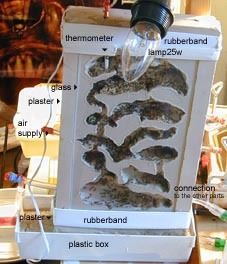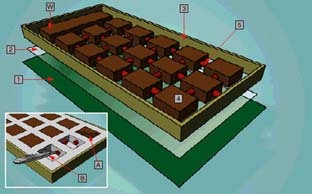
image from http://www.myrmecology.org/mac/af.htm#Index
af1[1].jpg(36kb)

plaster.jpg(217.kb) |
image from http://www.myrmecology.org/mac/af.htm#Index af1[1].jpg(36kb)  |
|
ein formicarium is einfach zu machen. ich benutze
gipsnester. man sieht alles. sie sind einfach
feucht zu halten und sie haben sich bewährt. das nest wird wie im bild oben hergestellt. ausser dass man bei horizontaler lagerung eine kammer nicht mit den anderen verbindet.dort schütten man wasser rein damit das nest feucht bleibt. ich aber bevorzuge die vertikale lagerung. es sieht besser aus und ist einfacher zu befeuchten. man stellt das fertige nest dann einfach in eine schmale plastikbox und füllt diese dann bis zur hälfte mit gips. dort kann man dann auch das wasser rein giessen. nicht verstanden? auf diesem bild(217.kb) sieht man es gut. ausser dem sollte man darauf achten dass, die gips wände nicht zu dünn sind (feuchtigkeit). man kann sie ruhig naturgetreuer gestallten. der gips lässt sich auch trocken noch bearbeiten und anbohren. weitere tips: luftlöcher nicht vergessen!! gipsnest vor inbetriebnahme unbedingt ganz durchtrocknen lassen(5 tage). gips mischen: die mischung muss weit mehr gips als wasser enthalten. genaue beschreibungen: Instructions for building artificial ant nests. (wenn nicht online hier!) AntCam - Ant Terrarium - Plaster/Gypsum - Step by Step instructions |
making a formicarium is simple . I use plaster nests . you see everything. it is easy to keep them moist and they have proven to me to be a good solution. the nest is manufactured as in the picture above. except that, if you store your nest horizontaly, one chamber is not connected with the others. it is used to be filled with water to keep the thing moist. I however prefer the vertical storage of the nest. it looks better and is easier to moisten. one places the finished nest simply into a narrow plastic box and fills it up to the half with plaster. in there you can pour water. didn't understand? on this picture(217kb). you can see everything. the walls off the chambers shouldn't be too thin for the moisture to flow. you can make the chambers more natur-like. the plaster can be still processed, worked and drilled also when drying or dried. further tips: do not forget ventilation holes!! plaster nest should fully dry (5 days) before used. mixing plaster: far more plaster then water is needed! step by step explanations: Instructions for building artificial ant nests. (if not online hier!) AntCam - Ant Terrarium - Plaster/Gypsum - Step by Step instructions |
|
wie mache ich einen auslauf? how to make an arena (free range basin)? |
 |